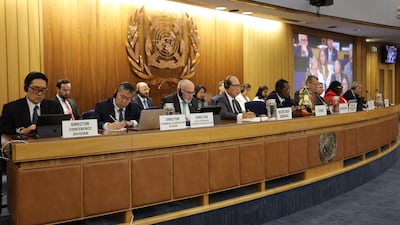A net-zero commitment has emerged from the international maritime industry as nations agreed to reduce greenhouse gas emissions to a set target by or around the year 2050.
A conference of the UN's International Maritime Organisation in London concluded on Friday by adopting new guidelines negotiated over the past week.
Previously, the shipping industry and associated activity such as shipbuilding and maritime-related finance had set a goal of halving emissions by 2050.
The adopted document set goals of declines of at least 20 per cent, striving for 30 per cent, by 2030 and “by at least 70 per cent, striving for 80 per cent, by 2040", compared with the 2008 baseline.
Shipping emits roughly the same level of greenhouse gases as aviation, which is aiming to be net zero by 2050.
Climate-vulnerable nations – particularly islands in the Pacific – and richer countries had faced stiff resistance from big exporters such as China.
The vast majority of the world's 100,000 cargo ships – which carry 90 per cent of the world's goods – are powered by diesel.
Shipping is responsible for about 3 per cent of global greenhouse gas emissions, according to the UN, but the trend lines have been improving.
During the event, the industry was called on to hit peak emissions from international shipping as soon as possible and to reach net-zero emissions by or around 2050, taking into account different national circumstances.
In addition, it called for efforts to phase out greenhouse gas emissions in line with the long-term 1.5ºC temperature goal set out in Article 2 of the Paris Agreement.
A new reporting regime on fuel use by the biggest ships was also adopted.
An IMO study in 2014 estimated that greenhouse gas emissions from international shipping in 2012 accounted for about 2.2 per cent of carbon dioxide emissions but warned that these would grow by between 50 per cent and 250 per cent by 2050.
A later study in 2020 estimated that emissions from shipping in 2018 accounted for 2.89 per cent of global anthropogenic greenhouse gas emissions and that such emissions could represent between 90 per cent and 130 per cent of 2008 emissions by 2050.
The opening session was address by the head of the UN climate change committee, Simon Stiell, who urged shipping to use the meeting as a platform to politically engage in the lead-up to Cop28, which opens in the UAE in November.
“This year’s global stocktake – a process under which countries assess the progress towards the Paris Agreement and how we take the steps to adjust and better meet those commitments, needs engagement from all,” Mr Stiell said.
“Therefore, I encourage the IMO’s strong participation in the political phase of the first global stocktake.”
IMP head Kitack Lim said there was a timeline of 2025 to develop and adopt technical and economic midterm measures, which could include some form of levy. He hailed the outcome as “monumental” because it preserved unanimity.
“With the revised strategy that you have now agreed on, we have a clear direction, a common vision, and ambitious targets to guide us to deliver what the world expects from us,” he told the closing session.
“Above all, it is particularly meaningful, to have unanimous support from all member states. In this regard, I believe that we have to pay more attention to support developing countries.”
After the conclusion, Vanuatu's representative to the UN meeting repeated a demand by developing nations for a tax on ships to incentivise change and compensate for the effects of climate change.
“A greenhouse gas levy, starting at $100 per tonne, is the only way to keep it there,” said Ralph Regenvanu.
“Ultimately, it’s not the targets but the incentives we put in place to meet them. So, we in the Pacific are going to keep up a strong fight for a levy that gets us to zero emissions by 2050.”
Carlos Fuller, permanent representative of Belize to the UN, gave the outcome the benefit of the doubt.
“We fought tooth and nail for these numbers – they aren’t perfect, but they give us a shot at staying within 1.5°C. And that’s what we came here to do,” he said.
“We’ll keep striving for an equitable 1.5°C transition by this sector.”
But observers at the London meeting decried the outcome as falling short.
Johannah Christensen of the Global Maritime Forum said the IMO must move urgently to adopt a policy of introducing a global shipping levy, not least to make it attractive for the industry to invest in zero-emission fuels and vessels.

“The level of ambition agreed is far short of what is needed to be sure of keeping global heating below 1.5C,” said John Maggs, president of the environmental Clean Shipping Coalition.
The 175-member grouping now essentially has a pillared emissions reduction strategy.
The indicative checkpoints for reductions by 2030, 2040 and sometime around 2050 was hard fought language that is used instead of absolute targets.
The prospect of an emissions price mechanism has moved into the IMO's working committees, and there are important new benchmarks for the so-called intensity of greenhouse gases in maritime fuels.
“A stronger alignment with the Paris Agreement, where shipping takes its prorated share, would require a more progressive reduction of emissions, reaching a 45 per cent reduction in 2030,” said Bo Cerup-Simonsen of Maersk Mc-Kinney Moller Centre for Zero Carbon Shipping.
“Still, we believe this strategy is a big step in the right direction.”


